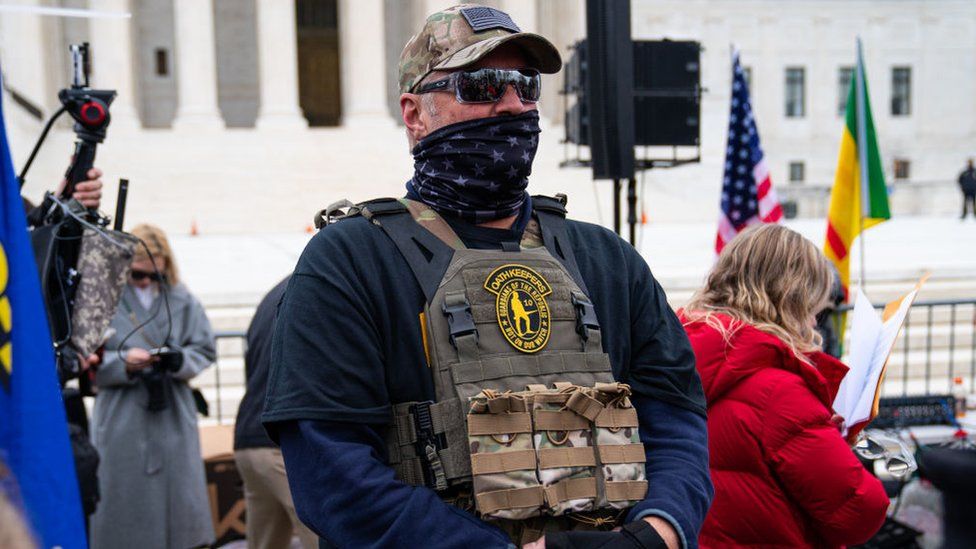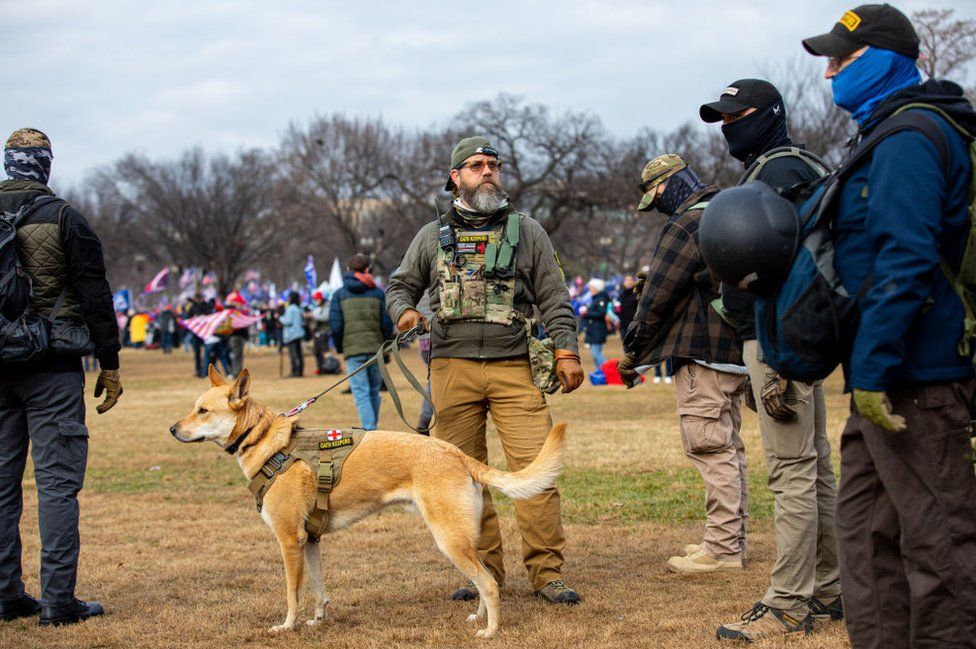-
Published
Related Topics

The leader of a far-right militia has been sentenced to 18 years in prison for his role in the US Capitol riot.
Stewart Rhodes, the founder of the Oath Keepers, was convicted on charges of seditious conspiracy and other crimes.
The sentence is the longest yet given to a Capitol rioter. Prosecutors had asked for 25 years.
Meanwhile, Kelly Meggs, the leader of the militia’s Florida chapter, was jailed for 12 years.
Rhodes remained outside the Capitol, but co-ordinated with Meggs and other members who stormed the building.
Rhodes and Meggs were also convicted of obstruction of an official proceeding and tampering with documents or proceedings in one of the highest-profile trials related to the riot on 6 January 2021.
At a hearing on Thursday, Rhodes showed little remorse, claiming he was a “political prisoner” and insisting that the Oath Keepers were standing in opposition to people “who are destroying our country”.
Judge Amit Mehta rejected those claims and expressed concern about Rhodes’ violent rhetoric, including a threat to hang former US House Speaker Nancy Pelosi.
“I dare say, Mr Rhodes, and I’ve never said this about anyone who I’ve sentenced: You, sir, present an ongoing threat and peril to this country, to the republic and the very fabric of our democracy,” the judge said.
“We all now hold our collective breaths with an election approaching,” he said. “Will we have another January 6th? That remains to be seen.”
Rhodes’ sentence was the longest handed out so far for the riot, where thousands of supporters of Donald Trump who objected to the result of the 2020 presidential election stormed the US legislature.
Prosecutors had asked for 25 years for Rhodes and 21 years for Meggs. Defence lawyers had argued for much lighter sentences of less than three years each.

Rhodes, a former US Army paratrooper and Yale-educated lawyer, founded the Oath Keepers in 2009.
Armed members of the anti-government group showed up at a number of protests and standoffs, and eventually became staunch supporters of Donald Trump. Dozens were present at the riot.
What did the Oath Keepers do on January 6?
Rhodes began a campaign to reject the results of the election two days after the November 2020 vote, while ballots were still being counted.
He messaged supporters: “We aren’t getting through this without a civil war… Prepare your mind, body, spirit.”
Rhodes and other Oath Keepers then spent thousands of dollars on weapons and equipment and stashed them in a hotel room in nearby Virginia just prior to 6 January 2021.
During the riot itself, Rhodes stayed outside the building taking phone calls and messages while other Oath Keepers, including some led by Meggs, stormed the building. Prosecutors said Rhodes acted like a “battlefield general” during the melee.

Defence lawyers argued that the weapons stash was never used and that the militia was on a purely defensive mission. They plan to appeal the convictions.
In interviews with the BBC last year, Rhodes’ estranged family said they had suffered years of abuse and neglect while the militia leader organised anti-government activists across the country.
Earlier this week his ex-wife Natasha Adams tweeted that a Montana court had granted her a divorce from Rhodes.
What is seditious conspiracy?
Rhodes and Meggs were convicted of seditious conspiracy, a little-used Civil War-era law that carries a maximum 20-year prison sentence.
It is distinct from the crime of treason, which carries a high burden of proof outlined in the US Constitution, and can lead to the death penalty.
Three other Oath Keepers who went on trial at the same time were found not guilty of seditious conspiracy but were convicted of lesser charges.
Judge Mehta ruled in favour of prosecutors who argued for a stiffer sentence for Rhodes under a “terrorism enhancement”. They argued that the Oath Keepers had sought to use “intimidation or coercion” against the US government.
Four other Oath Keepers were convicted of seditious conspiracy in January, and four members of the far-right Proud Boys were convicted on the charge earlier this month.
Most of the Capitol rioters were not part of an organised group, however.
In total, more than 1,000 people have been arrested in connection with the riot, and more than half have pleaded guilty to crimes including assault, theft, weapons charges, trespassing and obstructing an official proceeding.
Around 80 have been found guilty following a trial, according to the US Justice Department.
